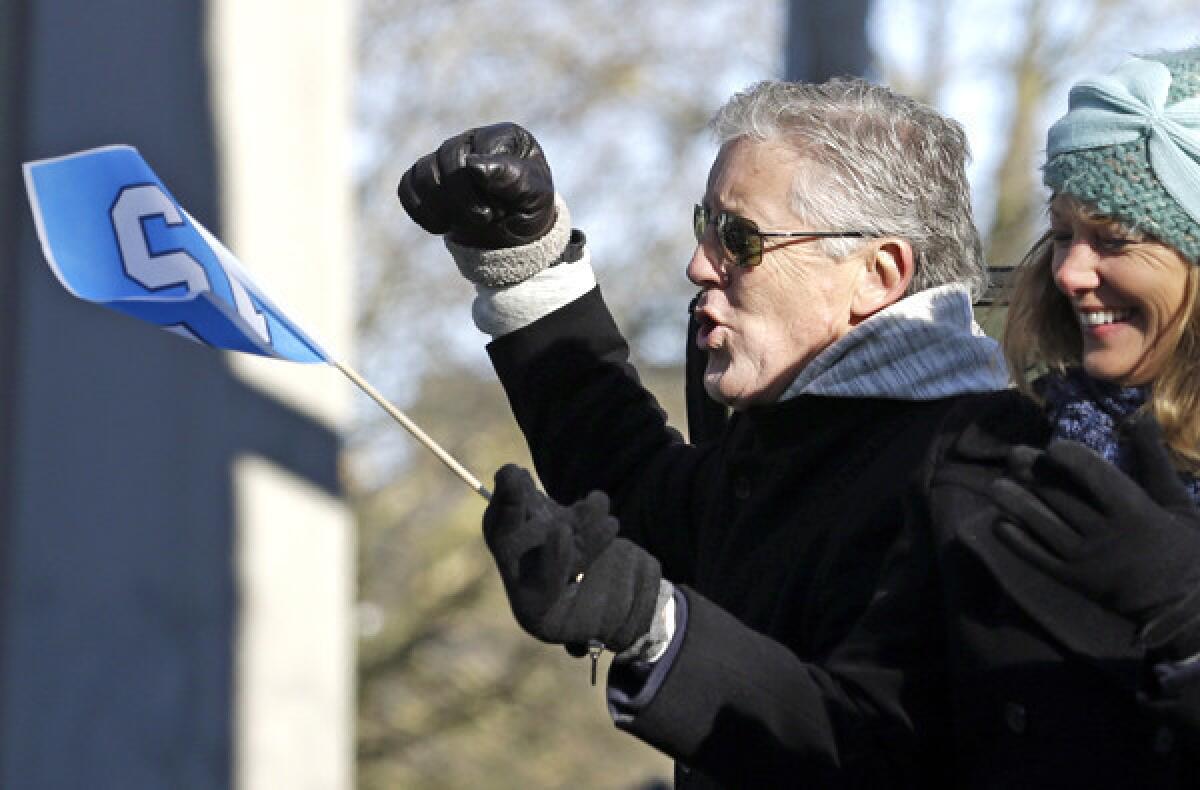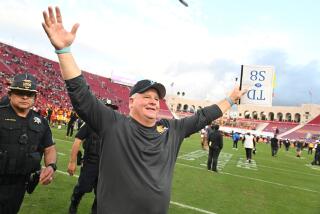Pete Carroll’s secrets to success: from locker room to classroom

- Share via
The reigning Coolest Guy on the Planet is on the phone, sounding a lot like your old man.
What?
“I think when an employer pays you $2, you ought to give him $3 worth of work,” Pete Carroll is saying from Seattle.
Gather ‘round, folks, for I’m about to pass along a gateway to the future — shiny as a Lombardi Trophy — where you make the most of every moment, don’t whine, never quit, and refuse to worry about what your opponents are up to.
It’s a liberating new approach based on some fatherly old advice. It’s Carroll’s secrets to success, based on all the things he’s learned in football. Say what you will about the guy — he breaks rules, he runs — but what he does mostly is succeed. To this day, his following among most Trojan fans is cult-like.
Look, I’ve been watching football for 50 years, and I’ve never seen a coach prepare a team the way Carroll does. Name one who’s done it better. Not Don Shula. Not Chuck Noll or even Bill Walsh. Mike Ditka maybe, but for one season only. The only coach who prepared a team this thoroughly was that little Italian American cuss they named the big trophy after.
Unlike Lombardi, Carroll inspires players not from fear, but from preparation and confidence building. The whole thing has a surprisingly moral center to it, even to those suspicious of self-improvement gurus (me) and Carroll’s past (maybe you).
Look, you don’t have to buy into the Pete Carroll myth. But, as with your old man, you’d better give him a good listen.
“There’s a method to the madness,” he says. “That means you’re competing on all levels.”
That’s the real world according to Pete. He’s been preaching such things for a while now, in seminars named for his bestselling book, “Win Forever.”
Now, the guy who jumped from academia to the pros is jumping back into academia. Last week, a class of MBA students at USC heard all about Carroll’s secrets to success in a daylong seminar led by his daughter, Jaime Davern, and Seahawks team psychologist Michael Gervais.
Carroll’s principles of high performance are also being embraced by the business world, most recently by marketing executives at Microsoft. But it is the potential at the college level that seems to excite Carroll the most.
“We want to scale it out and continue to push it,” he says between meetings on the upcoming NFL combine.
Now, I don’t have to tell you that Carroll’s passion sometimes gets in the way of his elocution. His subjects don’t always match the predicates. He is an odd combo of presentable yet unpolished.
Whatever his magic, the sunshiny overachiever always seems to get his point firmly across to 300-pound men who are inclined not to listen.
Here’s how. Instead of fear, he bases performance on building confidence. To do that, he advocates identifying who you are as an individual, then maximizing your unique skill set. He espouses thoughtfulness with energy — in equal parts, one bolstering the other.
Most surprising of all, he doesn’t worry about what the other team is up to. “You can’t control that,” says Carroll, who still keeps a home in Hermosa.
Central to his philosophy is superior preparation, which he credits for his recent Super Bowl win. If his departure at USC torqued his legacy, his credibility hit new highs this month with one of the most dominating title performances in NFL history.
Did the MBA students buy into it?
“I liked the idea of grit and how you get back up when you don’t succeed,” student Emma Sugerman said. “He’s got conviction for days. His passion just jumped off the screen.”
Professor Joe Priester, who organized the 15-member class, says he was impressed with the program’s healthy approach to competing and is going to suggest that Dean James G. Ellis make it part of the MBA orientation program.
Why wait? If I were king, I’d make Carroll’s principles part of undergraduate orientation, then give myself a big bonus. His philosophy is enabling. It is hopeful. It has the sheen of success about it. In a woe-is-me world of excuses, Carroll has found practical ways to compete and thrive.
“One of the tenets we want [young people] to know is that they can bring value to the employer,” Carroll says. “You don’t even need the best job. You get a job and do a kick-ass job of it and that will prepare you for the better job ... your dream job.”
Thanks, Dad.
twitter: @erskinetimes
More to Read
Go beyond the scoreboard
Get the latest on L.A.'s teams in the daily Sports Report newsletter.
You may occasionally receive promotional content from the Los Angeles Times.











